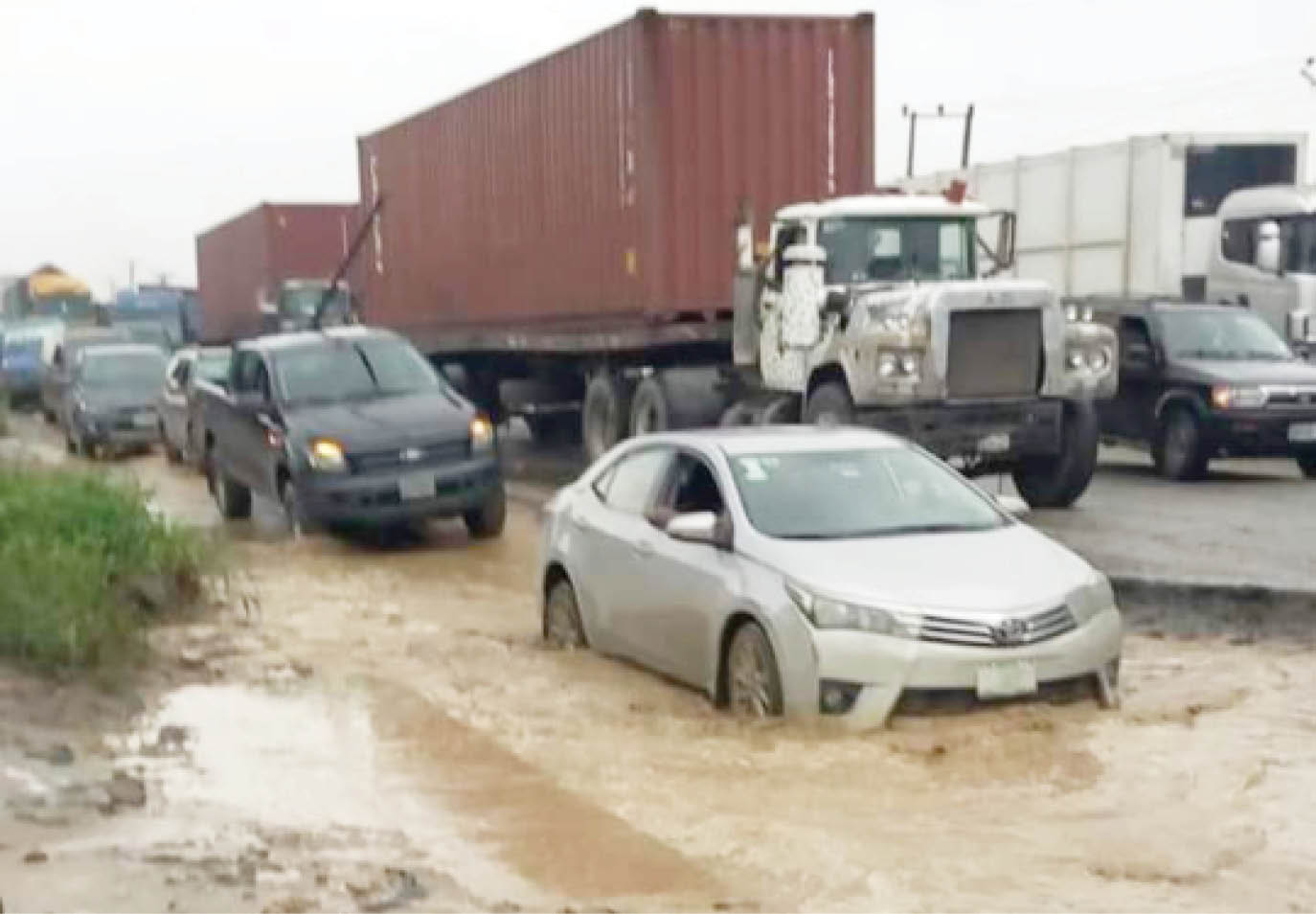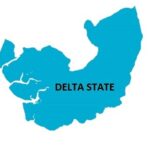Businessmen lament losses
Motorists tell tales of trauma, security risks
‘Govt neglect responsible’
FRSC urges safe driving culture
The deplorable states of Nigerian roads are not only alarming but also pose serious concerns, especially due to security risks and the socioeconomic implications. Despite government’s huge budgetary allocation for road construction, repairs and maintenance since 2016, scores of roads remain death traps and nightmares to motorists and other road users. Road infrastructure is pivotal to economic and social development of any country. Yet, several roads across states are left in sorry states and impassable, leading to accidents, loss of lives as well as property worth millions of naira. As the ‘ember’ season sets in, the reprehensible states of roads also heighten worries among road users. Daily Trust on Sunday begins a series with states in the South South and South East. Our reporters uncover some menacing roads begging for urgent attention.
By Clement Adeyi (Abuja), Victor Edozie (Port Harcourt), Usman A. Bello (Benin), Bassey Willie, (Yenagoa), Iniabasi Umo (Uyo), Eyo Charles, (Calabar) & Titus Eleweke (Awka)

Trauma on collapsed Calabar-Itu Federal Highway, businessmen, transporters lament losses
Anger, anguish, frustration, despair and trauma have been the case with travellers, residents and motorists that ply the Calabar-Itu Federal Highway for the past six or seven years, following the complete collapse of the road.
The menacing state of the road which stretches from Odukpani LGA end of Cross River State to Itu LGA in Akwa Ibom State, a distance of 50 minutes, has taken a toll on scores of lives and vehicles.
A journey of less than one hour from Calabar South to Uyo now takes six to seven hours. Several travellers now prefer to travel on the dangerous Calabar-Oron River.
The journey takes about 30 minutes at a cut-throat price of N4,000 in a speedboat that conveys 14 passengers despite that there is no adequate insurance, compared to the usual land journey which is N1,500.
A regular traveller and businessman, Mitchel Umoh, 39, from Calabar South, said: “It is risky to travel on speed boats and such big and deep river. There are risks of capsize and mechanical faults. Militants and pirates who lurk in the creeks are also serious risks? Although there are two security points manned by naval personnel and marine police. But how effective are they?”
Akwa Ibom residents who ply and live along federal roads like the Calabar-Itu Highway, Ikot Ekpene- Umuahia Road and Eparakwa- Ukanafun-Iwoukem-Azumini are worried over the poor state of the roads.
The Odukpani section of the road which is completely impassable poses a serious trauma to businesses men as well as other transporters, including heavy duty truck drivers and commercial buses. Quite often, hundreds of tankers from oil depots in Calabar bearing large quantities of petroleum products meant for distribution in other nearby states such as Akwa Ibom, Abia, Imo, Rivers and Bayelsa get stuck for days in ditches on the road.
This hampers distribution process and supply to the local markets.
The hiccup accounts for shortage and lack of fuel in outlets that depend on such tankers from the Calabar depot for supply. In the circumstance, oil distributors lose a lot, outrageous high price of fuel set in, while consumers bear the brunt.
Daily Trust on Sunday gathered that tankers are abandoned on the roads for several days and are reportedly at the mercy of miscreants who attempt to steal petroleum products.
Also, trucks conveying bags of cement and other goods in and out of Calabar are also reported to be facing the same challenges on a daily basis.
When heavy duty trucks fall into potholes, long queues of vehicles conveying passengers crop up. But in order not to spend longer hours on the road, motorists have resorted to self help and created ‘new roads’ in nearby bushes at the risk of their vehicles to be able to avoid the danger.
A commercial bus driver, Akpan Samuel, said: “I now ply this road twice a day, especially when there are no fallen vehicles. Uyo and Calabar used to be one and half or two hours drive, but it now takes six hours.”
“But sometimes, especially at weekends when oil tankers are on the road, we sleep here for days and nights. Large vehicles always fall into big holes. We commercial bus drivers and our passengers are the worst hit. We cannot deliver our daily payments to the owners of our buses. Passengers, too, spend endless hours on the road and miss appointments,” he added.
“One night at this very bad spot, bad boys came out with knives and other weapons and attacked me and my passengers. They dispossessed us of our valuables. This happens very regularly in this Calabar section of the road, which is a bit better towards Akwa Ibom axis,” Samuel said.
An oil truck driver, Musa Umoru, said: “My tyres have gone bad. I spend a number of days to fix not only tyres but also the bearings, the brakes and other things. God saved me one night when some gangs wanted to leak my fuel. But some soldiers stopped them.”
“I do pity other motorists and passengers because when my truck gets stuck in a ditch, they can’t pass, except they follow bush path.”
A business owner with chains of supply shops in Calabar and Uyo, Wilson Umosen, said he had lost millions of naira due to product and vehicle damage.
“I attempted to convey my goods through the Oron-Calabar River as an alternative. But it was a terrible experience. I had to discontinue it. I appeal to the Federal Government as well as the Cross River and Akwa Ibom states governments to jointly refurbish the road and later put up claims to the federal government since it’s a federal road. This way, they can assuage the plights of the road users,” Umoren said.
The Commissioner for Works, Dane Osim, said he had been to Abuja in the company of the Federal Controller of Works in the state over the road as well as other trunk A and B roads in the state.
He disclosed that his efforts had started yielding positive results, as the Federal Ministry of Works had responded and work had started in the failed Odukpani axis of the road.
Our correspondent gathered that it had been personally supervised by the Minister of Works, Babatunde Fashola.
But our correspondent also gathered that after Fashola had assured that the road would be duallised and work would continue, it was later stopped.
Daily Trust on Sunday, however, learnt that following Federal Government’s poise to rehabilitate the Calabar-Itu Highway, Fashola said it had begun to pay compensations to those whose houses, shops and economic trees were affected by the reconstruction work.
He insisted that government would not pay compensations for shrines that were hurriedly erected by the roadsides.

“Government is constructing major road in parts of Cross River, including rehabilitation of this Calabar-Itu highway. The rains are a big factor. We will ensure that the work goes on, including payments of compensations. But we won’t pay for shrines and such structures,” Fashola said.
The Special Adviser to the president on Niger Delta, Senator Ita Enang, has disclosed that the president had given an order against any further delays on the project.
Also, the senator representing the Cross River Southern Senatorial District, Gershom Bassey, assured the people efforts were ongoing with a view to ensuring that the Federal Road Maintenance Agency (FERMA), the Niger Delta Ministry as well as the Federal Ministry of Works guarantee completion of the project.
East West Road, nightmare
Plying the East West Road to the Ogoni axis of Rivers State as well as Akwa Ibom and Cross River states has been a daily nightmare for commuters. The road is the only gateway to Ogoni, Andoni, Opobo and other old eastern parts of Nigeria such as Akwa Ibom and Cross River states.
Not only travellers but also business activities suffer much trauma in the wake of the poor condition of the road as various multinational companies located along the road find it difficult to carry out their transport activities.
The first to express concern was the Petroleum Tankers Drivers Association which raised the alarm in 2017 over the deplorable state of the road. The leadership of the union had mobilized its members in 2017 to withdraw all its trucks from the Port Harcourt Refinery Company located along the road.
The tanker drivers’ grouse was that the poor state of the road had caused a huge damage to their trucks, and they spent so much money in repairing them.
Eleme youths drawn from socioeconomic and political divides staged a peaceful protest against the condition of the road.
The protest which paralyzed business activities along the road commenced after the 14 days ultimatum issued by the Pan-ethnic Social Rights Group, Ogoni People’s Assembly (OPA) to the Federal Government to carry out immediate reconstruction of the road or face a stiffer protest.
Also, business activities of major companies such as Petrochemicals, Nigeria Ports Authority, Port Harcourt Refinery Company and other military establishments along the road suffered.
One of the protesters, John Ollowi, told Daily Trust on Sunday that the youths got worried because the road had been left in the poor state despite huge sums of money raked in from companies located along the road.
The protest was suspended on July 31, following assurance by the Eleme Local Government Area Chairman, Obarilomate Ollor, that the contractor awarded the contract for the reconstruction of the road had been mobilized to the site.
Our correspondent gathered that the contractor had moved equipment to the site and getting set to commence remedial work on the road.
Government neglect responsible for bad road in Bayelsa
Commuters and motorists plying the Bayelsa State axis of the East-West Road have also decried the deplorable state of the road and called on the Federal Government to ensure proper repairs and maintenance of the road to ameliorate the sufferings of the road users.
A driver with one of the leading transport companies in Bayelsa, who simply identified himself as Emeka, said the portions of East-West Road from Mbiama in Rivers State to Zarama in Bayelsa, cutting across Kolokuma/Opokuma Local Government Area to the last village in Sagbama Local Government Area of Bayelsa State, which shares a bridge with Patani in Delta State are all in deplorable conditions.
A resident of Bayelsa State, Chuks Tare, who decried government neglect of the Bayelsa section of the road, said despite the huge allocation of revenue contributed by the state to the Federal Government, there is no federal presence in the state.
Anger in Edo over poor state of federal roads
In Edo, motorists and other road users have expressed anger and pains over the state of both the federal and state roads, which, they said, cause avoidable accidents and death.
Findings by our correspondent indicate that some federal roads in deplorable conditions include Benin-Auchi-Abuja road and Benin-Warri road. Most of the state roads, we also gathered, are also in bad condition.
Our correspondent gathered that the dualization work on the Benin-Auchi Road which began in 2012 under former President Goodluck Jonathan is at a low pace. Accidents and kidnappings are often reported on the road.
A motorist, Isaac Momodu, said most of the contractors had abandoned the road due to the rain season.
Another motorist, Abraham Igieduma, who also plies Benin-Auchi Road said there was no concrete plan to salvage the road during the ember months.
“The road is full of potholes and failed portions. The construction work that started during former President Goodluck Jonathan has not reached anywhere. The road is now a death trap for motorists,” he said.
Highways in Anambra, death traps
Our correspondent gathered that motorists in Anambra State are lamenting the deplorable state of the roads in the state, just as several road users are finding it difficult to access roads in the state. Remarkable among them is the Federal Highway, Amasea – Ugwuoba, along Enugu -Awka Expressway, which has become a death trap for motorists and commuters. Ekwulobia -Orumba Road is also a nightmare to motorists. Onitsha -Owerri Expressway is also in a deplorable state with motorists complaining bitterly about the impassable state of the road.
FG completes N40bn Port Harcourt/Aba Road
The federal government, has, however, lived up to expectation by fixing the Port Harcourt-Aba Road which was in a shabby condition for years.
The 41.5km eight lane dual carriage road which was completed at N40bn has been opened to motorists.
Hitherto, the road had remained a trauma to motorists, especially those that ply the road on daily basis to get to Aba in Abia State as well as Imo and Akwa Ibom states.
Before the contract was awarded in 1918, motorists and commuters used to spend days on the road before getting to their destinations.
Not only did several vehicles suffer huge damage, there was frequent auto accidents on the road.
Daily Trust on Sunday gathered that when the contract was eventually awarded, the contractor did not create any alternative route for commuters; a development that made motorists spend days on the road. Many businesses located on the stretch of the road used to be shut down due to inaccessibility to their various offices.
On several occasions, commercial bus drivers who plied the road daily carried out a peaceful protest on the need to complete the project in a record time.
The Minister of Works and Housing, Babatunde Raji Fashola, visited the project to ensure that the contractor completed it according to schedule and specification.
Some of the motorists who spoke with our reporter expressed joy over the completion of the road and unveiling for traffic.
John Umoh, a commercial bus driver, commended the Federal Government for the completion of the road.
“We are happy that we can now ply the Port Harcourt/Aba Road with ease without any stress. We used to spend days on this section of the road before we could get to our destinations. Thousands of hours were lost on this road, while lots of damage were done to our vehicles. But thank God, we are alive to see the completion of the road,” he said.
FRSC cautions against reckless driving
The Federal Road Safety Corps (FRSC) has called on commuters to imbibe a decent and safe driving culture. The Corps Public Education Officer, Bisi Kazeem, disclosed that aggressive sensitisation campaigns had commenced across all formations nationwide ahead of the ember months, following the deplorable condition of roads.
According to him, the Corps Marshal, Dr Boboye Oyeyemi, had made public the theme for this year’s Ember Months Public Enlightenment Campaign which is: “Maintain Safe Speed, Avoid Night Travels and Enjoy Quality Road Experience”.
He also called on the motoring public to drive safely and avoid any anti-safety behaviour that could lead to avoidable crashes on the roads.
Oyeyemi also cautioned drivers to avoid drunk-driving, maintain the legal speed limit, avoid dangerous driving and overloading of vehicles.

 Join Daily Trust WhatsApp Community For Quick Access To News and Happenings Around You.
Join Daily Trust WhatsApp Community For Quick Access To News and Happenings Around You.


